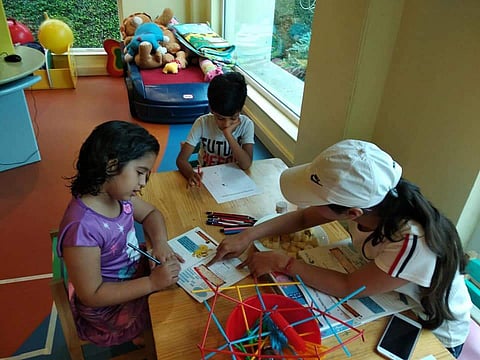

Will AI replace the humans in the global workforce? – This has been one of the re-occurring themes in public discourse surrounding Science and Technology of late. Educationist Ruchi Jhawar certainly thinks this is a possibility. “Within 10 or 15 years, only people who can think on their toes and innovate will be able to survive in the employment market of the future. The present schooling structure, unfortunately, is not good enough to produce such brilliant minds. As a result, there is a pressing need to develop the ‘thinking ability’ of children and bridge the lacunae in the education system that largely hinges on rote learning even today,” says Ruchi, who is also the co-founder of Cogitus, a supplemental learning programme that is devised to stimulate and activate the neurons by a multi-pronged approach of creative, cognitive and critical thinking in children belonging to the 4-14 age group.
“My partner, Anju Modi and I have been educationists for more than a decade now and decided to come up with a comprehensive programme to boost the thinking capacity and capability of children after seeing that this aspect was being largely ignored at schools. That’s when we developed the Cogitus curriculum two-and-a-half years ago, after consulting with experts around the world and launched a centre in Ranchi the same year too,” she says. Today, Cogitus has centres in Surat (Parle point & Vesu), Pune, Indore, Ranchi, Satna, Bengaluru and they plan to expand nationally too.
The four engaging modules of the annual program include:
Cogitus Mathologic - This module strengthens the decision-making and problem-solving skills in a child through games and play, spatial puzzles, placement mats, abstract questioning and more.
Cogitus Explore - With the world exploring inter-planetary elements and achieving milestones, it is essential for one to nurture the exploration skills of the child. The collaborative and interactive sessions encourage inquisitiveness in children, making them grow curious about their lessons and helping them understand the similarities and differences in the world around them -- across continents, countries and cultures. They learn the geographical skills of mapping and navigation, fall in love with the Atlas and cultures while debating about the current affairs and the effect on people from around the world.
Cogitus STEAM - STEAM is an innovative and contemporary curriculum, based on the idea of educating students in five specific disciplines of science, technology, engineering, arts and mathematics in an interdisciplinary and applied approach. Rather than treating the five disciplines as separate and discrete subjects, STEAM integrates them into a cohesive learning paradigm based on real-world applications.
Cogitus Create - This module enhances a child’s imagination; their exposure increases, enhancing their spectrum of thinking along with upping their problem-solving skills and creative thinking. It encourages out-of-the-box thinking, enabling them to create new products, advertisements, architectural designs, plans, visualising creative along with other benefits. The module is carried out in a way that enhances both the convergent and divergent thinking of a child.
So what kind of positive changes did Ruchi observe in children who attended the course? “For one, we saw that they were definitely able to think faster. Secondly, they were able to perform mathematical operations and logical problems efficiently, and finally they developed complex problem-solving abilities. For example, if we give them a real-life situation, they are able to deal with it better,” Ruchi explains, adding that each Cogitus trainer goes through scrutiny and proper training sessions before being selected to teach the children.
